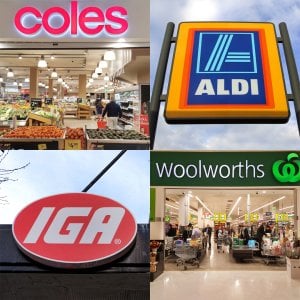Are Australian food giants Coles and Woolworths sneakily making more profit than their overseas counterparts?
- Replies 20
It's no secret that grocery costs have been inching upward, leaving us all in quite a conundrum. Even though everyone would rather spend our retirement bucks on something more enjoyable, feeding ourselves isn't exactly something we can just opt out of.
A recent analysis conducted exclusively by The Guardian Australia has brought to light some disconcerting data that indicates our local supermarkets, Coles and Woolworths, might be pocketing profits at a rate much higher than their overseas counterparts, primarily the British grocery behemoths Tesco and Sainsbury's. The gap in profits has seemingly widened during pandemic times, leading to fast-growing food bills.
The commercial landscape down under is dominated by Coles and Woolworths, which is a stark contrast to the European scene where competition is more robust. The implications of this difference are far from trivial and call for our attention. Vas Kolesnikoff, a governance expert with an investment banking background, expressed deep concern about the current situation.
'In Europe they have competition; Australia has very little,' he explained. 'It’s a huge concern. Coles and Woolworths are very strong and their margins are holding up.'
What's worrisome is that these two local bigwigs have managed to boost profit margins throughout the pandemic and inflation period, with their operating margins showing a hike to 5.3% at Coles and 5.9% at Woolworths. This is in contrast to the grocery divisions of the major UK chains, Tesco and Sainsbury's, which are 3.8% and 3%, respectively.
The Guardian Australia also conducted a poll where a whopping 72% of respondents were buying less due to higher costs, and 76% were opting for cheaper products or brands. That little flutter in your heart when you check your grocery bill? You're certainly not alone.
Now, what does all this mean for us? Frugality has its perks, but when demand is falling for grocery items and the supermarkets are still managing to increase profit margins, something's not adding up. This anomaly hints that the market might not be operating as efficiently as it should.
Anna Milne, an equity analyst at Wilson Asset Management, points out that Australian supermarkets face fewer pricing pressures than those in overseas markets, where competition is more intense. 'In markets such as the UK, competition is a lot more fierce. It’s a lot less cosy,' she noted.
The two ringmasters of the Australian supermarket circus, Coles and Woolworths, control a whopping two-thirds of the market. The only other notable competitor is ALDI, with an 11% share.
Coles stated that comparing their margins with overseas stores was challenging due to higher investment requirements due to their larger network in Australia. They credit their margin improvements to cost efficiencies and say they are investing more in value to customers. Woolworths, on their part, maintains that it isn't profiteering. They claim that competition has never been greater with international operators like ALDI and Costco now in Australia, along with many independent stores.
Even the Reserve Bank of Australia has had its say, noting that it doesn't believe profiteering is an issue or that it is causing inflation.
Out of curiosity, we conducted some research and stumbled upon a Reddit thread where a bunch of Australians were discussing this very report by The Guardian Australia, and from what we read, everyone seems to believe there is some kind of profiteering happening.
One Reddit user said, ‘Last time I went to my local grocer, I was pleasantly surprised by how comparatively affordable it was. I guess I ended up buying into the idea that local is always more expensive, but these days I don’t think it’s the case in a lot of circumstances.’
Another added, ‘Yes. Local greengrocer, local butcher, local flour mill (this is a location benefit though, really), and then ALDI for most of the rest. If I want to get something brand specific I will try and get it on sale from Coles or Woolies, but I’ve stopped doing most of my shopping there.’
However, there was one comment that specifically stood out to us, ‘I supply major vegetable lines to Coles, Woolworths, and ALDI, and I can safely say if you're still shopping at Coles and Woolworths while having monetary concerns, there are much much better alternatives available. Woolworths’ markup is usually around 200% from what they buy from growers in the vegetables sector.’
Andrew Leigh, the assistant minister for competition, says there's power in consumers seeking out a better deal. However, his words seem somewhat lacklustre when we consider the more proactive approach adopted by the UK, France, New Zealand and Canada. In these countries, pricing probes, parliamentary scrutiny, and threats of price controls and sanctions are being employed to pressurise supermarkets and food manufacturers to lower prices.

Let's be honest. We have no choice but to buy food—it's second only to housing costs as a major contributor to inflation. The dominance of the major chains means we're a little stuck. But knowledge is power, and the more we understand this situation, the more power we have to make informed decisions. And that's why we're here - to keep you in the know.
Let us know what you think of this story, members? We’d love to get your say on this one in the comments section below!
A recent analysis conducted exclusively by The Guardian Australia has brought to light some disconcerting data that indicates our local supermarkets, Coles and Woolworths, might be pocketing profits at a rate much higher than their overseas counterparts, primarily the British grocery behemoths Tesco and Sainsbury's. The gap in profits has seemingly widened during pandemic times, leading to fast-growing food bills.
The commercial landscape down under is dominated by Coles and Woolworths, which is a stark contrast to the European scene where competition is more robust. The implications of this difference are far from trivial and call for our attention. Vas Kolesnikoff, a governance expert with an investment banking background, expressed deep concern about the current situation.
'In Europe they have competition; Australia has very little,' he explained. 'It’s a huge concern. Coles and Woolworths are very strong and their margins are holding up.'
What's worrisome is that these two local bigwigs have managed to boost profit margins throughout the pandemic and inflation period, with their operating margins showing a hike to 5.3% at Coles and 5.9% at Woolworths. This is in contrast to the grocery divisions of the major UK chains, Tesco and Sainsbury's, which are 3.8% and 3%, respectively.
The Guardian Australia also conducted a poll where a whopping 72% of respondents were buying less due to higher costs, and 76% were opting for cheaper products or brands. That little flutter in your heart when you check your grocery bill? You're certainly not alone.
Now, what does all this mean for us? Frugality has its perks, but when demand is falling for grocery items and the supermarkets are still managing to increase profit margins, something's not adding up. This anomaly hints that the market might not be operating as efficiently as it should.
Anna Milne, an equity analyst at Wilson Asset Management, points out that Australian supermarkets face fewer pricing pressures than those in overseas markets, where competition is more intense. 'In markets such as the UK, competition is a lot more fierce. It’s a lot less cosy,' she noted.
The two ringmasters of the Australian supermarket circus, Coles and Woolworths, control a whopping two-thirds of the market. The only other notable competitor is ALDI, with an 11% share.
Coles stated that comparing their margins with overseas stores was challenging due to higher investment requirements due to their larger network in Australia. They credit their margin improvements to cost efficiencies and say they are investing more in value to customers. Woolworths, on their part, maintains that it isn't profiteering. They claim that competition has never been greater with international operators like ALDI and Costco now in Australia, along with many independent stores.
Even the Reserve Bank of Australia has had its say, noting that it doesn't believe profiteering is an issue or that it is causing inflation.
Out of curiosity, we conducted some research and stumbled upon a Reddit thread where a bunch of Australians were discussing this very report by The Guardian Australia, and from what we read, everyone seems to believe there is some kind of profiteering happening.
One Reddit user said, ‘Last time I went to my local grocer, I was pleasantly surprised by how comparatively affordable it was. I guess I ended up buying into the idea that local is always more expensive, but these days I don’t think it’s the case in a lot of circumstances.’
Another added, ‘Yes. Local greengrocer, local butcher, local flour mill (this is a location benefit though, really), and then ALDI for most of the rest. If I want to get something brand specific I will try and get it on sale from Coles or Woolies, but I’ve stopped doing most of my shopping there.’
However, there was one comment that specifically stood out to us, ‘I supply major vegetable lines to Coles, Woolworths, and ALDI, and I can safely say if you're still shopping at Coles and Woolworths while having monetary concerns, there are much much better alternatives available. Woolworths’ markup is usually around 200% from what they buy from growers in the vegetables sector.’
Andrew Leigh, the assistant minister for competition, says there's power in consumers seeking out a better deal. However, his words seem somewhat lacklustre when we consider the more proactive approach adopted by the UK, France, New Zealand and Canada. In these countries, pricing probes, parliamentary scrutiny, and threats of price controls and sanctions are being employed to pressurise supermarkets and food manufacturers to lower prices.
Key Takeaways
- Australia's major supermarkets, Coles and Woolworths, are significantly more profitable than their UK counterparts, Tesco and Sainsbury's, with the disparity increasing during the pandemic.
- The tightly held Australian market, dominated by these two chains, has sparked calls for reforms and stands in contrast to European markets with more competition.
- Evidence shows that despite increased prices and falling demand for grocery items, the major supermarkets are maintaining and even boosting their profit margins, indicating an improperly functioning market.
- There are concerns over the potential contribution of these profit margins to inflation, prompting calls for increased scrutiny and potential reforms in line with practices in the UK, France, New Zealand and Canada.
Let's be honest. We have no choice but to buy food—it's second only to housing costs as a major contributor to inflation. The dominance of the major chains means we're a little stuck. But knowledge is power, and the more we understand this situation, the more power we have to make informed decisions. And that's why we're here - to keep you in the know.
Let us know what you think of this story, members? We’d love to get your say on this one in the comments section below!








